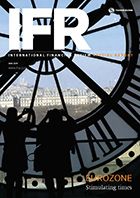Stimulating times: After years of bailouts, downturn, debt, fouls and penalties, it would appear the eurozone first team is finally showing signs of being ready to compete. The technical staff’s promise to do “whatever it takes” to keep the team together gave both players and supporters a lift. And after overcoming question of its legality, the additional stimulus provided by quantitative easing is providing additional confidence that they can cope should the team come unstuck once again.
The technical staff’s promise to do “whatever it takes” to keep the team together gave both players and supporters a lift. And after overcoming question of its legality, the additional stimulus provided by quantitative easing is providing additional confidence that they can cope should the team come unstuck once again.
To enhance the team’s overall performance, the ECB has resorted to injections – the €1.1trn (US$1.26trn) quantitative easing programme.
This has inevitably raised eyebrows, and a debate continues to rage about the legitimacy of pumping stimulants directly into the bloodstream of the region’s debt markets.
Watching the action from the dugout is Greece, an individualist whose style grates with the rest of the players and whose future in the team has been in grave doubt for the whole season.
Speculation about a Greek exit refuses to subside, casting a shadow over the Team’s performance – even though the right training programme could in theory bring the moody player back into the fold.
The crowd, however, is losing interest in this troublesome player, and it seems that the prospect of Grexit does not scare as badly as it once did.
Nevertheless, some Team Euro physicians remain sceptical, fearing that players have not trained hard enough to last a full match once the stimulus wears off.
Others, however, are still nursing heavy injuries with little immediate prospect of regaining past form.
Former playmaker, France was forced out to the wing but is showing signs of a return to form. It has been experimenting with its game, regaining a starting position through a resurgent capital market.
Nonetheless, Paris is frustrated by its teammates – who seem oblivious to the winger’s passes. Efforts to foster a pan-European private placement market that could rival the US are stumbling.
Other players are either struggling with fitness problems – or simply not playing ball.
The Austrians have clocked up a yellow card after they became embroiled in a squabble over the troubled Alpine region of Carinthia.
The province is teetering on the brink of bankruptcy after the government refused to vouch for debts left by bad bank Heta. Financial watchdogs sent them to the sin bin – imposing a debt moratorium on bond payments – and sparked legal action. A Commerzbank lawsuit represents the opening salvo in what is likely to be a messy brawl.
At least Team Euro can count on the enthusiasm of a new addition, Lithuania, even if its debut on the field as the last of the Baltic states to formally join the eurozone has not attracted much attention.
It may be small, but it’s keen, rising up through the EU club’s youth academy after being talent-spotted years ago.
The question, commentators say, is will Europe’s first team ever return to world-beating form without a new exercise regime: structural reforms to burn off rolls of fat and boost productivity.
Some experts say it is time to return to the treadmills in order to ease the eurozone’s debt burden and end long-term secular stagnation.
But could this pose issues of crowd control?
The spectators don’t realise yet, but as the calls for greater “labour market flexibility” grow louder, it is they who will have to foot the bill if they want to see their team defeat the opposition.
To see the digital version of this report, please click here
To purchase printed copies or a PDF of this report, please email gloria.balbastro@thomsonreuters.com
